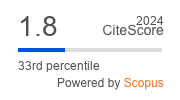Algorithm Comparation of Naive Bayes and Support Vector Machine based on Particle Swarm Optimization in Sentiment Analysis of Freight Forwarding Services
Komparasi Algoritma Klasifikasi Berbasis Particle Swarm Optimization pada Analisis Sentimen Ekspedisi Barang
Abstract
The needs of the community for freight forwarding are now starting to increase with the marketplace. User opinion about freight forwarding services is currently carried out by the public through many things one of them is social media Twitter. By sentiment analysis, the tendency of an opinion will be able to be seen whether it has a positive or negative tendency. The methods that can be applied to sentiment analysis are the Naive Bayes Algorithm and Support Vector Machine (SVM). This research will implement the two algorithms that are optimized using the PSO algorithms in sentiment analysis. Testing will be done by setting parameters on the PSO in each classifier algorithm. The results of the research that have been done can produce an increase in the accreditation of 15.11% on the optimization of the PSO-based Naive Bayes algorithm. Improved accuracy on the PSO-based SVM algorithm worth 1.74% in the sigmoid kernel.
Downloads
References
T. A. Lorosae, B. D. Prakoso, Saifudin, and Kusrini, “Analisis Sentimen Berdasarkan Opini Masyarakat Pada Twitter Menggunakan Naive Bayes,” Semin. Nas. Teknol. Inf. dan Mutimedia, 2018.
J. Ipmawati, Kusrini, and E. Taufiq Luthfi, “Komparasi Teknik Klasifikasi Teks Mining Pada Analisis Sentimen,” Indones. J. Netw. Secur., vol. 6, no. 1, pp. 28–36, 2017.
R. Raksanagara, Y. H. Chrisnanto, and A. I. Hadiana, “Analisis Sentimen Jasa Ekspedisi Barang Menggunakan Metode Naïve Bayes,” Anal. Sentimen Jasa Ekspedisi Barang Menggunakan Metod. Naive Bayes, pp. 19–24, 2016.
N. Saputra, T. B. Adji, and A. E. Permanasari, “Analisis Sentimen Data Presiden Jokowi dengan Preprocessing Normalisasi dan Stemming Menggunakan Metode Naive Bayes dan SVM,” J. Din. Inform., vol. 5, no. November, p. 12, 2015.
A. Novantirani, M. K. Sabariah, and V. Effendy, “Analisis Sentimen pada Twitter untuk Mengenai Penggunaan Transportasi Umum Darat Dalam Kota dengan Metode Support Vector Machine,” e-Proceeeding Eng., 2015.
F. S. Jumeilah, “Penerapan Support Vector Machine (SVM) untuk Pengkategorian Penelitian,” J. RESTI (Rekayasa Sist. dan Teknol. Informasi), vol. 1, no. 1, p. 19, 2017, doi: 10.29207/resti.v1i1.11.
R. R. Setiawan et al., “Analisis Sentimen Pariwisata di Kota Malang Menggunakan Metode Naive Bayes dan Seleksi Fitur Query Expansion Ranking,” J. Pengemb. Teknol. Inf. dan Ilmu Komput., 2017, doi: 10.1074/jbc.M209498200.
J. Abellán and J. G. Castellano, “Improving the Naive Bayes classifier via a quick variable selection method using maximum of entropy,” Entropy, vol. 19, no. 6, 2017, doi: 10.3390/e19060247.
A. W. Attabi, L. Muflikhah, and M. A. Fauzi, “Penerapan Analisis Sentimen untuk Menilai Suatu Produk pada Twitter Berbahasa Indonesia dengan Metode Naïve Bayes Classifier dan Information Gain,” J. Pengemb. Teknol. Inf. dan Ilmu Komput. Univ. Brawijaya, vol. 2, no. 11, pp. 4548–4554, 2018.
B. S. Prakoso, D. Rosiyadi, H. S. Utama, and D. Aridarma, “Klasifikasi Berita Menggunakan Algoritma Naive Bayes Classifer Dengan Seleksi Fitur Dan Boosting,” J. RESTI (Rekayasa Sist. dan Teknol. Informasi), vol. 3, no. 2, pp. 227–232, 2019, doi: 10.29207/resti.v3i2.1042.
Y. Zhou, N. Wang, and W. Xiang, “Clustering Hierarchy Protocol in Wireless Sensor Networks Using an Improved PSO Algorithm,” IEEE Access, vol. 5, pp. 2241–2253, 2017, doi: 10.1109/ACCESS.2016.2633826.
F. Pramono, Didi Rosiyadi, and Windu Gata, “Integrasi N-gram, Information Gain, Particle Swarm Optimation di Naïve Bayes untuk Optimasi Sentimen Google Classroom,” J. RESTI (Rekayasa Sist. dan Teknol. Informasi), vol. 3, no. 3, pp. 383–388, 2019, doi: 10.29207/resti.v3i3.1119.
A. Taufik, P. Studi, and S. Informasi, “Optimasi Particle Swarm Optimization Sebagai Seleksi Fitur Pada Analisis Sentimen Review Hotel Berbahasa Indonesia Menggunakan Algoritma Naïve Bayes,” vol. III, no. 2, pp. 40–47, 2017.
Copyright (c) 2020 Jurnal RESTI (Rekayasa Sistem dan Teknologi Informasi)

This work is licensed under a Creative Commons Attribution 4.0 International License.
Copyright in each article belongs to the author
- The author acknowledges that the RESTI Journal (System Engineering and Information Technology) is the first publisher to publish with a license Creative Commons Attribution 4.0 International License.
- Authors can enter writing separately, arrange the non-exclusive distribution of manuscripts that have been published in this journal into other versions (eg sent to the author's institutional repository, publication in a book, etc.), by acknowledging that the manuscript has been published for the first time in the RESTI (Rekayasa Sistem dan Teknologi Informasi) journal ;








